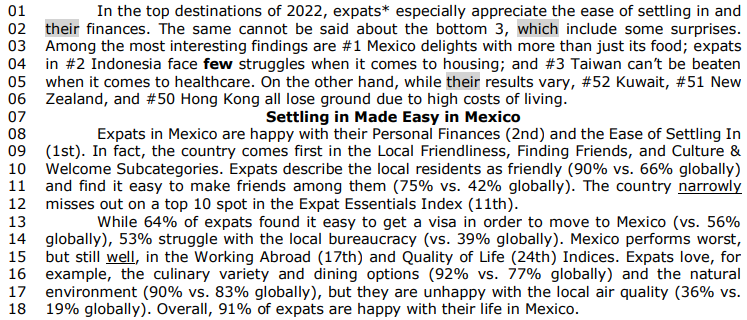Questões de Inglês - Advérbios e conjunções | Adverbs and conjunctions para Concurso
Foram encontradas 517 questões


Try these expert tips for a safer solo trip

(Available at: https://news.airbnb.com/try-these-expert-tips-for-a-safer-solo-trip/ – text especially adapted for
this text).
Look at the map below and complete the sentence with the correct word. Choose the CORRECT answer.

“The gas station is _________ the stadium.”

Text 2 – Computers
(Text adapted from History of Computing. Retrieved from
https://www.cs.utexas.edu/~mitra/csFall2006/cs 303/lectures/history.html)
When you hear the term computers, it’s difficult to
imagine different devices from a laptop or a small
desktop. Believe it or not, they weren’t always like
they are today. They used to be very large and
heavy, sometimes as big as an entire room. Some
technology professors historically define computers,
as “a device that can help with computations”. The
word computation involves counting, calculating,
adding, subtracting, etc. The modern definition of a
computer is a little wider, because in our day and
age, computers store, compile, analyze and
compute an enormous amount of information.
Ancient computers were very interesting. Actually,
the first computer may have been located in Great
Britain, at Stonehenge. It is a man-made circle of
large stones. Citizens used it to measure the
weather and forecast the change of seasons. Some
specialists say that another ancient computer is the
abacus. It was used by the early Romans, Greeks,
and Egyptians to count and calculate. Even though
they are no longer in use, certainly, these early
devices are fascinating. Computers are embedded
in our history and some people say that we are
completely dependent of them. No matter the
complexity of the task, easy or difficult, some people
can’t do anything without them. Do you contest or
share this opinion?
I. in order to avoid the use of pronouns. II. to adapt to the textual genre and the levels of formality or informality of the text. III. with the intention of introducing gaps in the understanding of the text.
Text CB1A2-I
Although an oft-cited poll showed that 85% of Americans approve of organ donation, less than half had made a decision about donating, and fewer still (28%) had granted permission by signing a donor card, a pattern also observed in Germany, Spain, and Sweden. Given the shortage of donors, the gap between approval and action is a matter of life and death.
What drives the decision to become a potential donor? Within the European Union, donation rates vary by nearly an order of magnitude across countries and these differences are stable from year to year. Even when controlling for variables such as transplant infrastructure, economic and educational status, and religion, large differences in donation rates persist. Why?
Most public policy choices have a no-action default, that is, a condition is imposed when an individual fails to make a decision. In the case of organ donation, European countries have one of two default policies. In presumed-consent states, people are organ donors unless they register not to be, and in explicitconsent countries, nobody is an organ donor without registering to be one.
We examined the rate of agreement to become a donor across European countries with explicit and presumed consent laws. If preferences concerning organ donation are strong, we would expect defaults to have little or no effect. However, defaults appear to make a large difference: the four opt-in countries (Denmark, Netherlands, United Kingdom, Germany) had lower rates than the six opt-out countries (Austria, Belgium, France, Hungary, Poland, Portugal, Sweden). The two distributions have no overlap, and nearly 60 percentage points separate the two groups
Our data suggest changes in defaults could increase donations in the United States of additional thousands of donors a year. Because each donor can donate for about three transplants, the consequences are substantial in lives saved. Our results stand in contrast with the suggestion that defaults do not matter. Policy-makers performing analysis in this and other domains should consider that defaults make a difference.
Eric J. Johnson; Daniel Goldstein. Do Defaults Save Lives?
Internet: <www.dangoldstein.com> (adapted).
1. Our high turnover rate has been a growing _______ for us. 2. A rose in full bloom had been allowed to grow _______ one of the walls. 3. The company is growing _______ all the time. 4. Opposition to the latest proposals is growing _______ . 5. The Catholic community in Edinburgh began to grow _______ in the mid-19th Century.
( ) considerably ( ) steadily ( ) concern ( ) bigger ( ) unchecked up

Julgue o item subsequente.
Julgue o item subsequente.
Julgue o item subsequente.
Text CB2A2
Anyone who has interacted with superbot ChatGPT or image generator DALL-E might be wondering what the future of artificial intelligence (AI) holds for humanity.
ChatGPT is an AI program that generates text in a very human-like manner when asked questions. Just ask DALL-E or similar programs to create a picture of a French bulldog driving a pink convertible and voila: you’ll see several versions in seconds.
Science fiction in the mid-20th century created good-natured AI such as the computer on Star Trek helping the Enterprise crew, as well as its evil twin set on destroying its creators like HAL in Arthur C. Clarke’s famous book (or Stanley Kubrick’s 1968 film adaptation) 2001: A Space Odyssey. In 2023, however, we’re surrounded by AI that’s far more mundane than those examples. The virtual assistant in your smartphone, the airline chatbot and the robot vacuum cleaning your floors don’t seem to have any aspirations to rise above humanity and have been designed to help us.
We should be prepared for bigger things to come than games, better chatbots or photo generators. Connectivity is key: think of AI as a general-purpose innovation like electricity that powers and connects other technologies, including sensors, robots, genomic devices and 3D printers. AI’s use will only intensify and accelerate as faster computing technology is developed, along with greater sensors capturing data, often called the Internet of Things (IoT). In the future, AI will be interwoven in virtually every aspect of commercial and personal activities.
Peter Marber. Artificial Intelligence: Why Should We Care?.
Internet:
Considering the linguistic and semantic aspects of text CB2A2, judge the following item.
The adverb “virtually”, as used in the last sentence of text,
means nearly.
Based on the previous text, judge the following item.
The words “impulsively” and “easily”, in the first paragraph,
and the word “disability”, in the third paragraph, are
examples of adverbs in English.